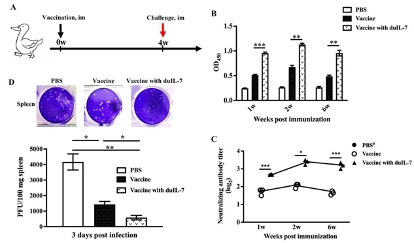Duck tembusu virus (DTMUV) can induce ovarian lesions in female ducks, resulting in a severe decrease of egg production. Consequently, DTMUV infection accounts for a great economic loss in the poultry industry in China. Therefore, effective strategies to prevent DTMUV infection are required. Vaccination is one of the best methods to prevent DTMUV infection. Although there are commercial inactivated and attenuated vaccines available, these require multiple injections, resulting in a drain on human and material resources. In order to enhance the immune efficacy of DTMUV vaccine and promote its long-term immunity, duck-derived IL-7 (duIL-7) was introduced into DTMUV vaccine. Intramuscular injection of DTMUV inactivated vaccine with or without duIL-7 was administered twice to the ducks. The results showed that duIL-7 was able to promote rapid antibody responses and enhance DTMUV-specific IgG and neutralizing antibody production to the vaccine. T follicular helper (Tfh) cells play a key role in assisting long humoral immunity. It was found that duIL-7 upregulated duIl-6 and duIl-21 gene expression at 3 w post first vaccination, which are Tfh cell differentiation-related cytokines. It may be the reason that duIL-7 could prolong the humoral immune response to the inactivated DTMUV vaccine. Next, the ability of duIL-7 in simplifying immunization procedure of the inactivated DTMUV vaccine was tested. When ducks were immunized once, the titers of neutralizing antibodies in ducks from the inactivated DTMUV vaccine supplemented with duIL-7 group were significantly higher than those of ducks from the inactivated DTMUV vaccine group (P < 0.05). In addition, duIL-7 could assist the inactivated DTMUV vaccine in maintaining neutralizing antibodies at high levels during the whole experimental period. The viral titers were opposite to the neutralizing antibody levels. Overall, duIL-7 possessed the ability to promote and prolong humoral immune responses to the inactivated DTMUV vaccine, even at one dose. This study may provide a new efficient adjuvant for avian vaccine development. https://doi.org/10.1016/j.vetmic.2023.109665.


